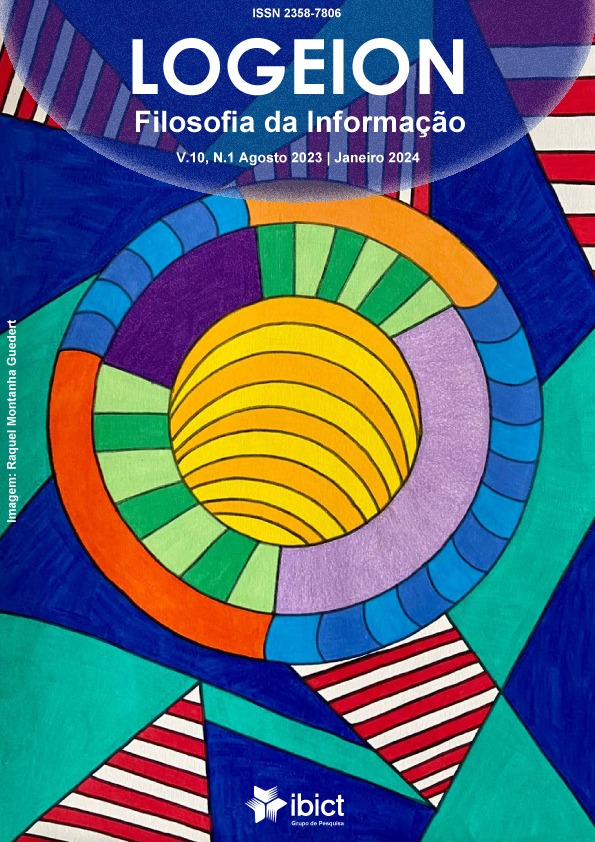The rhizome and the figure of the book in virtual and dematerialized information
discussions in Information Science and Knowledge Organization
DOI:
https://doi.org/10.21728/logeion.2023v10n1.p145-164Keywords:
Rhizome, Dematerialized information, Information Science.Abstract
The rhizome is the proposal of a philosophical thought applied to virtual information and, at the same time, the realities not contemplated in Information Science and Knowledge Organization in the dematerialization of its object. the research aims to discuss dematerialized information under the philosophical concept of the rhizome and its principles in Information Science and Knowledge Organization, as well as the figure of the book. The discussion is perpetuated in critical aspects in which Information Science and Knowledge Organization establish limits, traces, structures or authority in their way of treating, organizing and sharing information and knowledge. The research has as methodological procedures a theoretical, bibliographical study, which interrelates aspects of the philosophy of difference, more precisely, the study of the rhizome of Deleuze and Guattari with Information Science and the Organization of Knowledge. Contrary to the idea of a tree, the rhizome automatically emerges in the relations of the trees of knowledge used as a basis for organizing and representing knowledge. These representational models can no longer organize knowledge and information in the face of the liquefaction of their structures in the virtual pole. The problem is to understand how Information Science adjusts to the rhizomatic reality of virtual information.
Downloads
References
BENEVENUTTO, F. E.; SILVA, M. R. da; MOSTAFA, S. P. A repercussão de Gilles Deleuze na Ciência da Informação. DataGramaZero: Revista de Ciência da Informação, Rio de Janeiro, RJ, v. 16, n. 3, ago. 2015.
DELEUZE, G.; GUATTARI, F. Mil platôs: capitalismo e esquizofrenia. Tradução Aurélio Guerra Neto e Célia Pinto Costa. Rio de Janeiro, RJ: Ed. 34, 1995. 94 p. (Coleção TRANS, v. 1).
GIL, A. C. Métodos e técnicas de pesquisa social. São Paulo: Atlas, 2002.
LÉVY, O. O que é virtual? Tradução Paulo Neves. 2. ed. São Paulo, SP: Editora 34, 2011. (Coleção TRANS). 160 p.
LÉVY, P. A inteligência coletiva: por uma antropologia do ciberespaço. Tradução Luiz Paulo Rouanet. 9. ed. São Paulo, SP: Edições Loyola, 2014.
LÉVY, P. As tecnologias da inteligência: o futuro do pensamento na era da informática. Tradução Irineu da Costa. Rio de Janeiro, RJ: Editora 34, 1993. (Coleção TRANS). 208 p.
LÉVY, P. Cibercultura. Tradução Carlos Irineu da Costa. Rio de Janeiro, RJ: Editora 34, 1999. (Coleção TRANS). 272 p.
MONTEIRO, S. D. A organização virtual do conhecimento no ciberespaço. DataGramaZero: Revista de Ciência da Informação, Rio de Janeiro, RJ, v. 4, n. 6, dez. 2003.
MOREIRA, W. Provocações deleuzeanas para as linguagens documentárias. InCID: Revista de Ciência da Informação e Documentação, Ribeirão Preto, v. 1, n. 2, p. 21-36, 2010.
MOSTAFA, S. P. Conhecimento, informação e meios de transmissão cultural. Informação e Sociedade: Estudos, João Pessoa, PB, v. 22, n. 3, p. 95-100, 2012.
MOSTAFA, S. P. Epistemologia ou filosofia da ciência da informação? Informação & Sociedade: Estudos, João Pessoa, PB, v. 20, n. 3, p. 65-73, set./dez. 2010.
SALES, R. de. Devir-rizoma: tumulto na organização e representação do conhecimento. Liinc em Revista, Rio de Janeiro, RJ, v. 14, n. 2, p. 259-275, nov. 2018. Disponível em: http://revista.ibict.br/liinc/article/view/4316. Acesso em: 30 maio 2023.
SANTAELLA, L. Comunicação ubíqua: repercussões na cultura e na educação. São Paulo, SP: Paulus, 2014. (Comunicação).
SANTAELLA, L. Cultura e artes do pós-humano: da cultura das mídias à cibercultura. São Paulo, SP: Paulus, 2003.
SANTAELLA, L. Linguagens líquidas na era da mobilidade. 2. ed. São Paulo, SP: Paulus, 2007. (Comunicação).
Downloads
Published
Issue
Section
License
Copyright (c) 2023 Logeion: Filosofia da Informação

This work is licensed under a Creative Commons Attribution-NonCommercial-ShareAlike 4.0 International License.
The journal is published under the Creative Commons - Attribution - Noncommercial - Share Alike 3.0 Brazil.
The published work is considered collaboration and therefore the author will not receive any remuneration for this as well as anything will be charged in exchange for publication.
All texts are responsibility of the authors.
It’s allowed partial or total reproduction of the texts of the magazine since the source is cited.




